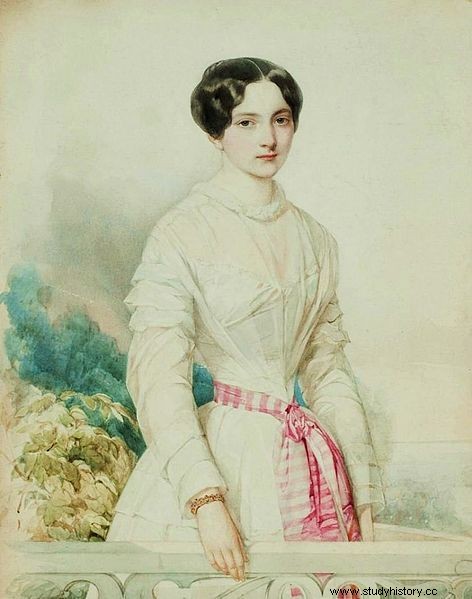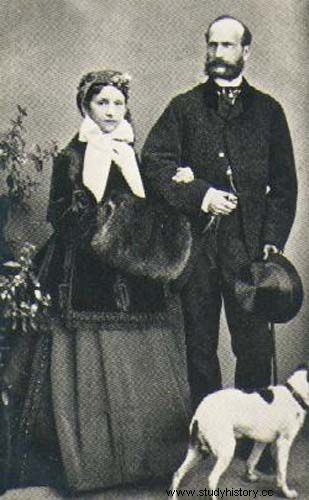On April 30, 1884, Princess Victoria of Hesse, daughter of the reigning ruler Louis IV, and Prince Louis Battenberg, was married in Darmstadt, the German capital of Hesse. Crowds poured out on the streets of the beautifully decorated city, cheering the young couple and watching the cavalcade of carriages in which the wealthiest of the world rode. The eye was primarily attracted by the bride's grandmother - Queen Victoria. In one of the carriages rode the groom's mother - Julia, Duchess of Battenberg (1825-1895), née a Polish countess Hauke. It was a great personal triumph of a Polish woman:thirty years ago, no one suspected that "this poor Polish orphan", as Miss Hauke in St. Petersburg called with pity, would join the world's elite.
Julia's father was the Polish general Maury Hauke, the hero of the Napoleonic Wars, who in the years 1815-1830 served as quartermaster of the Congress Poland army. The man died at the hands of the insurgents on the first day of the November Uprising as he tried to stop them from revolting. In the summer of 1831 his widow died.
Unfortunate love
Soon Nicholas I ordered to bring 6-year-old Julia and her siblings to St. Petersburg. The girl ended up at the Institute for Noble Maidens (Smolny Institute), after which she became the lady of the court of Grand Duchess Maria Alexandrovna, heir to the throne and wife of the future Alexander II. At the same time, her younger brother, Prince Aleksander Heski, was staying at the court, with whom the Polish woman fell in love with each other.
As the woman did not belong to the ruling family, their marriage was impossible. The couple had to hide their relationship, but one day Nicholas I himself found out about their love, who turned into the wrong passage of the Winter Palace and saw Julia and Alexander kissing.

Julia Hauke in her youth
The emperor demanded that the Prince of Hesse break with Julia. Then Aleksander secretly decided to marry a Polish woman. The lovers left Russia in October 1851 and got married in one of Wrocław's churches.
Julia returns to the salons
After getting married, Julia didn't even have a surname! She lost her own after the wedding; being a morganatic (lower born) wife, she could not become a Hessian duchess. Alexander's brother, Ludwik III, the Grand Duke of Hesse, came to the rescue and gave her and the children born from this union the title of count and the surname of Battenberg. Alexander joined the Austrian army to support his family. The Duke of Hesse was still welcomed in the royal palaces and his wife was persona non grata in Europe.

Julia Hauke
At the beginning of the 1860s, when the echoes of this scandal were heard, Julia and Aleksander settled in Darmstadt, and Louis III raised the rank of a Polish woman, giving her the title of a duchess. At the same time, Alice, daughter of Queen Victoria, who married the heir to the throne of that state, came to the capital of Hesse. The Englishwoman quickly became friends with Julia and expressed her appreciation in letters to her mother. While visiting Alice, the powerful monarch met Julia and was charmed by her. Queen Victoria's acceptance sealed the final rehabilitation of the Battenbergs in Europe.
Polka climbs to the tops
Julia, who had to endure a lot of humiliation because of her origin, did everything to avoid a similar fate for her children. She and her husband educated their sons and used her influence to promote their careers. When the independent Kingdom of Bulgaria was established after the Congress of Berlin in 1878, the signatories of the treaty were looking for the ruler of the new state. Aleksander Heski then proposed his son Alexander, who had previously fought in the ranks of the victorious Russians during the Russo-Turkish war (1877–1878). Alexander II supported this candidacy and in 1879 only 22-year-old son of a Polish woman became the Prince of Bulgaria.
Unfortunately, in 1886, the young prince Battenberg abdicated and greatly disappointed his ambitious mother, who preferred to see her son… dead rather than fleeing Bulgaria. It should be noted that at the request of the Bulgarians, Alexander, who died in 1893 of peritonitis, was buried in Sofia. To this day, he is highly venerated there as the first ruler of the country.

Aleksander Heski and Julia Hauke
The other children of the Polish woman did not disappoint her. Louis, born in 1854, made an outstanding career in the British Navy, and in 1884 he married Victoria Heska, granddaughter of Queen Victoria. It was a union made of love, and the British monarch supported the choice of her namesake. It was during the wedding of Victoria and Ludwik that the youngest daughter of Queen Beatrice fell in love with another Battenberg! It was Henryk (Liko) - son of Aleksander and Julia.
In accordance with the will of her mother, Beatrice was to remain an old maid and act as the personal secretary of the kings. In order not to let the thought of getting married dawned in her daughter's mind, her mother forbade the courtiers to pronounce the words "wedding" or "engagement" in the presence of the girl. Wiktoria was reluctant to Beatrice's marriage and gave way only at the urging of Ludwik Battenberg, the husband of her granddaughter Wiktoria. Henryk and Beatrycze got married in 1885.
Watching the wedding ceremony, the touched Queen commented: "I guess it rarely happened that a couple equally happy kneeled in front of the altar." . Beatrycze and Liko were happily married and became parents of four children. In 1896, Henryk died. His death devastated Queen Victoria:"We get the impression that with the death of our dear noble Liko, the sun has left our home."
Less prestigious - though very appropriate - marriages were concluded by Maria and Franz Józef. The woman married a minor German prince Gustav Erbach-Schönberg, and her brother married the daughter of the prince of Montenegro.
Julia Hauke's Blood
A Polish woman, who died in 1895, was not able to see the greatest triumphs of her descendants. In 1923 Luiza, the daughter of Wiktoria Hesse and Ludwik Battenberg, married the heir to the throne of Sweden - Gustav Adolf who ascended the throne in 1950. The couple had no children. Admittedly, at the time of the wedding, the bride's name was Lady Luiza Mountbatten, because in 1917 - on a wave of anti-German sentiment - her father, living in Great Britain, renounced his German title and adopted a more English surname - Mountbatten.
In 1906, Victoria Eugenie, daughter of Beatrice and Henry, married King Alfonso XIII of Spain. King Felipe VI, who reigns there today, is Julia Hauke's great-great-great-grandson.

Felipe VI is Julia Hauke's great-grandson
An even more unusual fate befell the descendants of Alicja, the eldest daughter of Wiktoria Hesse and Ludwik Battenberg. In 1903, this young lady married Prince Andrew of Greece. In 1921, after the birth of four daughters, the couple became parents of a boy - Filip. Soon the Greek royal family had to go into exile, Alice fell mentally ill and found herself in a closed institution; the boy's father lived in Monte Carlo. Philip was taken care of by Grandma Victoria, who lived in the Kensington Palace. The boy received a typical English upbringing, in 1939 he joined the Royal Navy, during World War II he was on English destroyers.
At the same time, Philip met his distant cousin - Elizabeth, heir to the British throne. Infatuation turned into true love and the Greek prince officially asked them to marry the young lady. Philip relinquished his Greek title, assumed British citizenship and the name of his grandmother - Mountbatten. On their wedding day on November 27, 1947, Julia Hauke's fiancé - great-grandson - was awarded the title of Duke of Edinburgh. Elizabeth ascended the throne on February 6, 1952, after the death of her father. Her son and successor Karol, Prince of Wales, is thus the great-great-grandson of a Polish woman.
Bibliography:
Wiernicka V. Polish women who ruled the Kremlin. Warsaw, 2018
